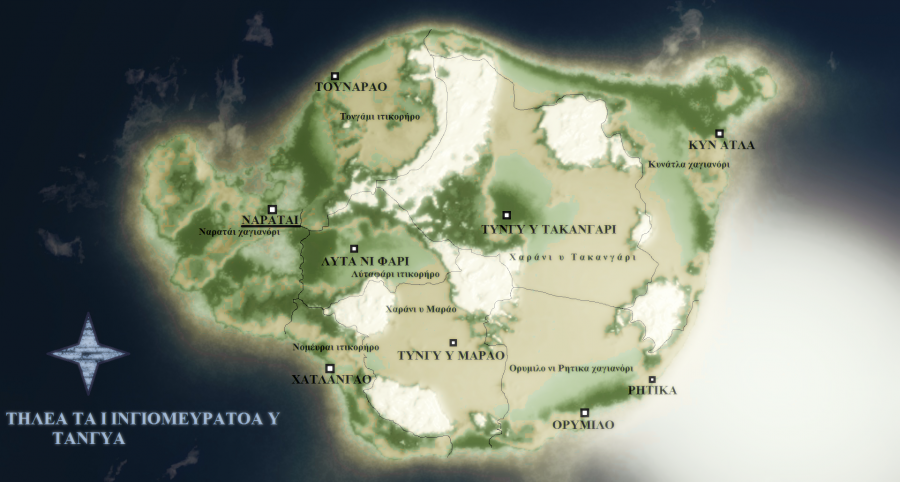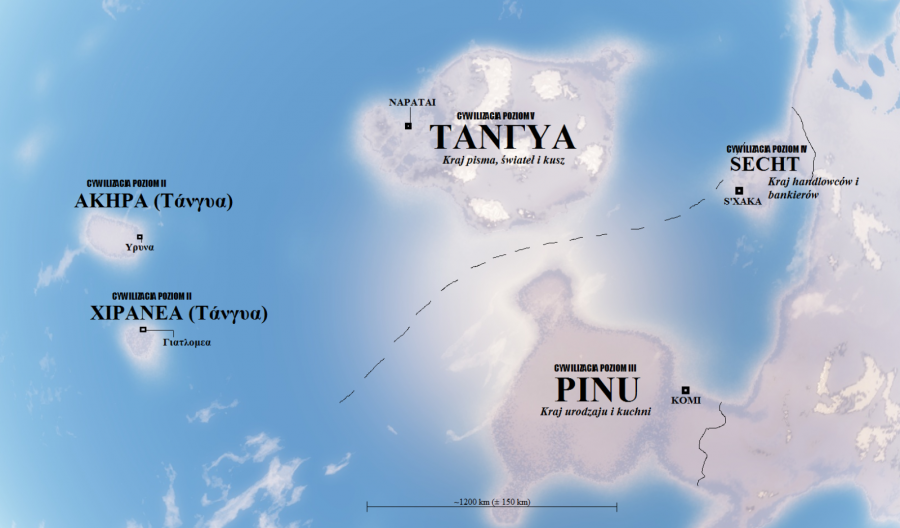En/Tangia: Różnice pomiędzy wersjami
m |
m |
||
| Linia 15: | Linia 15: | ||
: <code>'''''Attention:''' this is a translation of the [[Tangia|original article]], it may be incomplete and/or outdated.''</code> | : <code>'''''Attention:''' this is a translation of the [[Tangia|original article]], it may be incomplete and/or outdated.''</code> | ||
| − | [[Plik:Tangia_secht_pinu.png|thumb|left|Tangia in its region]]{{sp}}'''Tangia''' ([[Język ayu|Ay.]] ''Tangua''/''Τανγυα'' /'taŋwa/ "Tangua") oficially '''the State of Tangia''' ([[Język ayu|Ay.]] ''Teileā i Tangua''/''Τηλεά υ Τανγυα'' /'tejlea i 'taŋwa/), internally known rather as ''Tangua Hō’ūm''/''Τανγυα Χό'ύμ'' ([[Język ayu|ay.]] /'taŋwa hoːʔuːm/) - empire located on a large island south of [[Kyon]]'s equator, west from its supercontinent. Known as the country of crossbows, the national ordinance, and lights, due to mass use of luminescent fluids collected from endemic animals (mainly amphibians) for production of light-emitting paint. Country known for its powerful navy and expansive behaviour towards oceanic countries. Inhabited by Tangians (''Tanguarai''/''Τανγυαραι''). It is located on the whole island bearing the same name (''Nēimi i Tangua''/''Νήμι υ Τανγυα'' " | + | [[Plik:Tangia_secht_pinu.png|thumb|left|Tangia in its region]]{{sp}}'''Tangia''' ([[Język ayu|Ay.]] ''Tangua''/''Τανγυα'' /'taŋwa/ "Tangua") oficially '''the State of Tangia''' ([[Język ayu|Ay.]] ''Teileā i Tangua''/''Τηλεά υ Τανγυα'' /'tejlea i 'taŋwa/), internally known rather as ''Tangua Hō’ūm''/''Τανγυα Χό'ύμ'' ([[Język ayu|ay.]] /'taŋwa hoːʔuːm/) - empire located on a large island south of [[Kyon]]'s equator, west from its supercontinent. Known as the country of crossbows, the national ordinance, and lights, due to mass use of luminescent fluids collected from endemic animals (mainly amphibians) for production of light-emitting paint. Country known for its powerful navy and expansive behaviour towards oceanic countries. Inhabited by Tangians (''Tanguarai''/''Τανγυαραι''). It is located on the whole island bearing the same name (''Nēimi i Tangua''/''Νήμι υ Τανγυα'' "the Island of Tangia"), the Remote Isles Group, and colonies. Giant armadillos (glyptodonts) are native to the island. |
Tangia is a highly developed country with great handle of writing, it is the largest supplier of paper and ink in its part of the world. Its metalwork is highly valued. The country grasped optics, protecting the gained knowledge about scopes and telescopes for itself. A police-state with army as the highest importance. Tangia has a huge naval force (called ''Takatōa''), possibly the largest in the world, and it is close to invincible on the seas (only the Secht Confederation, in defence, twice sunk the Tangian navy). On land, Tangian army is also formiddable, albeit more developed countries can defeat it. | Tangia is a highly developed country with great handle of writing, it is the largest supplier of paper and ink in its part of the world. Its metalwork is highly valued. The country grasped optics, protecting the gained knowledge about scopes and telescopes for itself. A police-state with army as the highest importance. Tangia has a huge naval force (called ''Takatōa''), possibly the largest in the world, and it is close to invincible on the seas (only the Secht Confederation, in defence, twice sunk the Tangian navy). On land, Tangian army is also formiddable, albeit more developed countries can defeat it. | ||
Wersja z 18:23, 5 wrz 2018
| ||||||||||||||||||||||||||||||||||||||
Attention: this is a translation of the original article, it may be incomplete and/or outdated.
Tangia (Ay. Tangua/Τανγυα /'taŋwa/ "Tangua") oficially the State of Tangia (Ay. Teileā i Tangua/Τηλεά υ Τανγυα /'tejlea i 'taŋwa/), internally known rather as Tangua Hō’ūm/Τανγυα Χό'ύμ (ay. /'taŋwa hoːʔuːm/) - empire located on a large island south of Kyon's equator, west from its supercontinent. Known as the country of crossbows, the national ordinance, and lights, due to mass use of luminescent fluids collected from endemic animals (mainly amphibians) for production of light-emitting paint. Country known for its powerful navy and expansive behaviour towards oceanic countries. Inhabited by Tangians (Tanguarai/Τανγυαραι). It is located on the whole island bearing the same name (Nēimi i Tangua/Νήμι υ Τανγυα "the Island of Tangia"), the Remote Isles Group, and colonies. Giant armadillos (glyptodonts) are native to the island.
Tangia is a highly developed country with great handle of writing, it is the largest supplier of paper and ink in its part of the world. Its metalwork is highly valued. The country grasped optics, protecting the gained knowledge about scopes and telescopes for itself. A police-state with army as the highest importance. Tangia has a huge naval force (called Takatōa), possibly the largest in the world, and it is close to invincible on the seas (only the Secht Confederation, in defence, twice sunk the Tangian navy). On land, Tangian army is also formiddable, albeit more developed countries can defeat it.
Tangia as a project is led by Canis. It is one of the first and founding countries of project Kyon.
Country name
The word Tangia is of unknown original. It has been interpreted as the common name of the sea-folk, although it most likely is a later-coined interpretation. No related words are known in the Ayu language.
Between the English name "Tangia" and the original Ayu "Tangua" there is a vowel difference, the original "u" is pronounced as "i", this is a change to make the country name similar to names of many regions in the English language, where names often end in -ia.
Name in different languages
| Language | Short name | Full name | Ideological concept |
|---|---|---|---|
| Ayu | Tangua Τανγυα |
Teileā i Tangua Τηλεά υ Τανγυα |
Tangua Hō’ūm Τανγυα Χό'ύμ |
| English | Tangia | State of Tangia | Tangian Night |
| Polski | Tangia | Państwo Tangia | Noc Tangijska |
Politics
Fairly recently, Tangia officially switched from its former federal system to absolute monarchy. The process was smooth and took its time, based on significant growth of popularity of the religious philosophical movement Yūl-Yōa (starry water). Remnants of its federal structure are still clearly seen in the country, where individual member states are formed as monarchies, presidential republics, or are based on traditional tribal system with extra-state representatives, however, currently their powers are significantly restricted by what Yūl-Yōa allows.
Slogans
Solar eclipse shrouding Tangia.
The national slogan of the Tangians is still "Ιχη φινεο υ'ιτα", that is, "only the first grace". In current times, often a soldier's chant is used: "Τανγυα χό'ύμ! Τανγυα χό'ύμ! Χό'ύμ! Χό'ύμ!" (Tangua hō’ūm! Tangua hō’ūm! Hō’ūm! Hō’ūm!). The word "χό'ύμ" ("hō’ūm") means "night" and refers to the ideological concept of spreading the Tangian authority across all oceans, much like night falls onto the horizon, in such a way, that there would always be a point of Tangian influence over which the starry night lasts.
Political system
Tangia is ruled by absolute authority of its emperor. The change of the federal system composed of kingdoms, republics and less relevant emperor into a centralised monarchy with real power based on a religious philosophical movement is relatively recent.
The former Tangian Commonwealth was ruled by the Highest Council, where representatives or monarchs of individual regions took their seats, plus the emperor, who acquired the throne in a dynastical manner. Last such emperor was Meinopau Rēiki (Μηνοπαυ Ρηκι) the "Dreary" (rēikei). After internal turbulence, Kaliā from the Yūl-Yōa sect became the next empress, and the sect became state ideology, with totalitarian rule restricting many citizens' freedoms (which Tangia during its federational times did not have too many anyway), but it also modernised and ideologically united the country.
Administrative division
The country is divided as follows::
- Nēimi i Tangua Νήμι υ Τανγυα - the Island of Tangia:
- Naratāi Hayanōri Ναρατάι Χαγιανόρι - Naratai Kingdom (capital: Naratāi Ναραται)
- Tongāmi Itikorēiro Τονγάμι Ιτικορήρο - Tongami Republic (capital: Tounarao Τουναραο)
- Lutafāri Itikorēiro Λυταφάρι Ιτικορήρο - Lutarafari Republic (capital: Luta ni Fāri Λυτα νι Φάρι)
- Harāni i Marao Χαράνι υ Μαραο - Harani Desert (capital: Tungu i Marao Τυνγυ υ Μαραο - Marao oasis)
- Orumilo ni Reitika Hayanōri Ορυμιλο νι Ρητικα Χαγιανόρι - Orumilo and Reytika Kingdoms (capitals: Orumilo Ορυμιλο, Reitika Ρητικα)
- Harāni i Takangāri Χαράνι υ Τακανγάρι - Takangari Desert (capital: Tungu i Takangāri Τυνγυ υ Τακανγάρι - Takangari desert)
- Kunatla Hayanōri Κυνατλα Χαγιανόρι - Kunatla Kingdom (capital: Kun Atla Κυν Ατλα)
- Yarau i Kana Nēimi Γιαραυ υ Κανα Νήμι - Remote Isles Group:
- Akēira Ακήρα - (capital: Uruna Υρυνα)
- Hiranea Χιρανεα (capital: Yatlomēa Γιατλομέα)
Table overview:
| Administrative division | Name (Lat/Gr) | Capital (Lat/Gr) | System | Ruler | Population | Climate/terrain | |||
|---|---|---|---|---|---|---|---|---|---|
| Nēimi i Tangua Νήμι υ Τανγυα :: the Isle of Tangia | |||||||||
| Naratai Kingdom | Naratāi Hayanōri Ναρατάι Χαγιανόρι |
Naratāi Ναραται |
Monarchy | King | 32,12% of the island |
rainforests, swamps, grasslands, shores | |||
| Tongami Republic | Tongāmi Itikorēiro Τονγάμι Ιτικορήρο |
Tounarao Τουναραο |
Republic | President | 18,64% of the island |
rainforests, grasslands, steppes, plateau, high mountains, shores | |||
| Lutarafari Republic | Lutafāri Itikorēiro Λυταφάρι Ιτικορήρο |
Luta ni Fāri Λυτα νι Φάρι |
Republic | President | 12,92% of the island |
rainforests, savannah, mountains, steppe | |||
| Harani Desert | Harāni i Marao Χαράνι υ Μαραο |
Tungu i Marao Τυνγυ υ Μαραο |
Desert | Tribal Council Chieftain | 3,62% of the island |
steppe, desert, grasslands, plateau, high mountains, shores | |||
| Orumilo and Reitika Kingdoms | Orumilo ni Reitika Hayanōri Ορυμιλο νι Ρητικα Χαγιανόρι |
Orumilo, Reitika Ορυμιλο, Ρητικα |
Dual kingdom |
Monarch | 20,50% of the island |
savannah, grasslands, rainforests, mountains, shores | |||
| Takangari Desert | Harāni i Takangāri Χαράνι υ Τακανγάρι |
Tungu i Takangāri Τυνγυ υ Τακανγάρι |
Desert | Chieftain | 1,64% of the island |
desert, rainforests, forests, steppes, plateau, high mountains | |||
| Kunatla Kingdom | Kunatla Hayanōri Κυνατλα Χαγιανόρι |
Kun Atla Κυν Ατλα |
Monarchy | King | 10,56% of the island |
shores, forests, rainforests, grasslands, steppes, mountains | |||
| Yarau i Kana Nēimi Γιαραυ υ Κανα Νήμι :: Remote Isles Group | |||||||||
| Akēira | Akēira Ακήρα |
Uruna Υρυνα |
Monarchy | King | 64,22% of remote isles |
shores, grasslands, plateau | |||
| Hiranea | Hiranea Χιρανεα |
Yatlomēa Γιατλομέα |
Monarchy | King | 35,78% of remote isles |
shores, grasslands, plateau | |||
Kolonizacja

Tangia jako zamożny, wysoko rozwinięty kraj o wysokiej populacji i dużych ambicjach, ale ograniczonych ideologicznie przez strach przed kontynentem, nie ma innego kierunku rozwoju jak morza. W obecnych czasach wiele jest nieodkrytych, niezamieszkałych, bądź słabo rozwiniętych wysp, które Tangia jest w stanie podbić, choć z uwagi na znaczne odległości, może nie być w stanie dobrze kontrolować.
Tangia stosuje niewolnictwo. Obywatel Tangii nigdy nie może się stać niewolnikiem. Uzyskanie wolności jest zaszczytem, ponieważ na to trzeba się wykazać nie tylko odwagą czy szczęściem, ale jest to zjawisko rzadkie. Istnieją wzajemne porozumienia z państwami obcymi, na mocy których obywatele Tangii nie mają prawa być brani jako niewolnicy, a i Tangia obywateli tych państw nie rozpozna nigdy jako niewolników. Czym innym są oczywiście więzienia.




